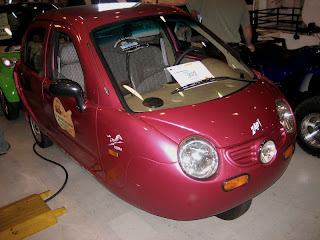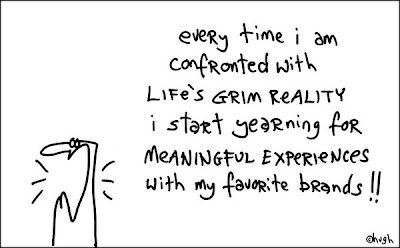My last post on Friday (Introduction to Link Love posts with examples) had an article on MSNBC/Careerbuilder about "green collar jobs". I would like to, again, reiterate the fact that I am rue to link to anything on Careerbuilder but you're not likely to be inundated with spam by simply clicking on the link (like you will by signing up for their loosely titled "service") so I'll make an exception.
First off, it's important to point out that this article is about as far from me, with respect to intent, as it could possibly be. The point of this article is to point out that there's this great new sector that's likely to grow based on sound-bites from our presidential candidates. The article says nothing about personal responsibility, purpose in life, or altruism through self-sacrifice. Careerbuilder is certainly not going to help you find meaning in your work by guiding you in a direction to make a difference in any way. But I digress; this post is not meant to inaugurate "Bash CB Day."
The article talks, first, about the possibility of new jobs appearing based on forward-looking statements by Obama, Clinton, and McCain. I'll just quote the one that makes any difference whatsoever:
Democratic Sen. Barack Obama -- "We've also got to do more to create the green jobs that are jobs of the future. My energy plan will put $150 billion over 10 years into establishing a green energy sector that will create up to 5 million new jobs over the next two decades."
Brilliant! Hopefully it's clear to you why I'm excited about that but why should you care?
I have seen an interesting phenomenon with my own eyes time and time again and have even participated in it myself. People find it quite easy to remove the responsibility of their own participation in an industry or company by simply explaining to themselves (and others) that "it pays the bills." What can you do? You're working for the man, they pay your rent, it's not really your responsibility to ensure that your job is environmentally responsible or kind to humans and animals or even legal. Does this sound familiar? Is this logic rational? Do you even think about what you actually do at work and what you're contributing to?
Just so we're clear, if I'm pointing any fingers, there are certainly a few pointing back at me. At my last job, animal testing was done on-site. I found myself in a very uncomfortable moral and financial situation, one shared by a colleague. It all came to head (sorta) when a company memo was circulated that advised employees to be aware that animal rights activists might show up on-site. I asked myself if I could casually walk past a group of like-minded people picketing my building and report to my job. I knew the answer was no and I'm no longer employed there (for other, more pragmatic reasons as well).
Your contribution(s) to the job you hold play(s) a part in the success of whatever entity to which you belong. Your good job, good ideas, and hard work will, generally, have a positive effect on the structure above and below you. If this innovation, perspiration, and motivation is sold to a corporation/company/person who strives for environmental sustainability, community improvement, and/or financial equality than you also own a piece of those good deeds. If, on the other hand, your great work belongs to a company that exploits both people and nature, you, in turn, own a piece of that victimization. It's only fair that it works both ways.
As usual, there is an obstacle to making a career choice like this. There always will be ethical ambiguity in all the choices we make and actions we take. Maybe you decide to take a job with Ford Motor assembling Hybrid Escape SUVs. Every bolt you put in, every battery you connect, and every gauge you install moves this vehicle closer and closer to helping someone fulfill their desire to use less gasoline. On the flip side, every Hybrid Escape sold puts money in the pocket of a company named as one of our country's biggest polluter. What's a conscious citizen to do?
Adding "the fate of the known world" into your considerations for a career is a pretty heavy burden to absorb; you're not going to reverse global warming because you chose a company with fleet cars that had better MPG. You're also not going to feel very socially conscious if after talking up your new Prius purchase you have to admit the monthly payments come from Chevron's pockets.
My overall point is this:
Every choice you make has a potential social, cultural, and environmental impact. The first step is being truly aware of this, the next is actually doing something about it.
From the article, here are a few green career options that have my stamp of approval:
- Furniture making (there are some amazing examples of sustainable furniture designers out there)
- HVAC (if you pick your company wisely)
- Green landscaping (something I'm planning on really getting into when I buy a house [soon] and something that I imagine to be very fulfilling and relaxing)
- Green building (again, you have to be company conscious
- Part-time Chemistry student, part-time marketing coordinator, part-time freelance Technology Coach (not sure I would recommend this route).





